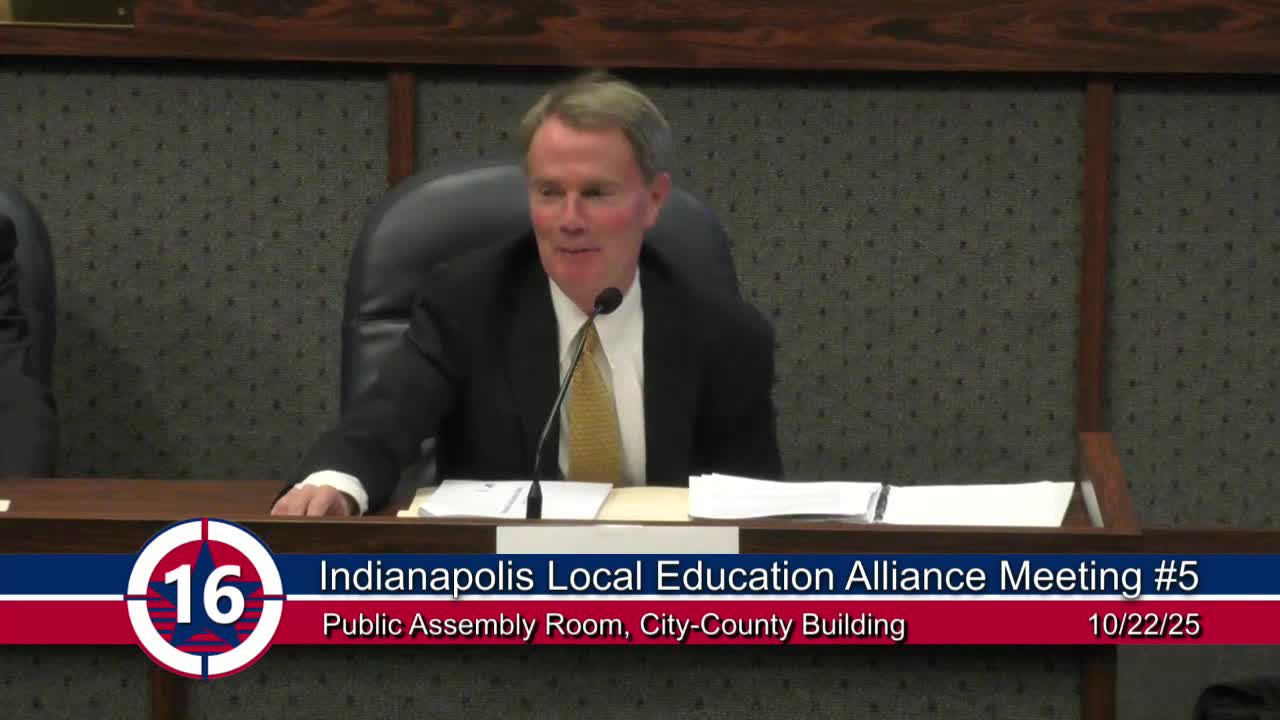Public commenters urge ILEA to recommend fully elected IPS board, charter moratorium and transparency on property-tax spending
Get AI-powered insights, summaries, and transcripts
Subscribe
Summary
Dozens of Indianapolis residents told the Local Education Alliance to preserve a fully elected Indianapolis Public Schools board, place a moratorium on new charter schools inside IPS boundaries and require public accounting of property-tax funds sent to charters and transportation arrangements.
Speakers at Tuesday’s Indianapolis Local Education Alliance meeting used the public‑comment period to press the alliance for recommendations that preserve a fully elected Indianapolis Public Schools board, halt additional charter openings within IPS boundaries and increase transparency on how charter schools spend property-tax revenue.
More than two dozen individuals spoke during the allotted public comment time; Alliance staff said written comments submitted online would be shared with members afterward. Commenters included parents, teachers, community leaders and former and current IPS graduates. Several said they were part of a coordinated petition drive that had collected more than 2,000 signatures asking for unified standards and clearer local accountability.
Anh Nguyen, who identified herself as a parent and immigrant, framed her remarks around democratic accountability: “Democracy only works when all members answer directly to voters,” she said, and urged opposition to any proposal to make the school board partially appointed.
Other commenters urged an immediate moratorium on opening new charter schools within IPS boundaries while roughly 9,000 unfilled seats remain and the district faces declining enrollment, a point raised explicitly by several speakers. Kate Scott, who said the far-right state legislature was using governance debates to push for vouchers and private-religious options, asked the alliance to recommend “a fully elected school board with no new committees or boards or special seats.”
Speakers also demanded detailed public accounting of how property-tax revenue distributed to charter schools is spent. Mary Ann Schlegel Ruger said Purdue Polytechnic High School’s Broad Ripple campus had spent about $154,000 on two yellow buses to transport students from outside IPS boundaries while students living inside the IPS boundary received only an Indigo City bus pass; she asked the alliance to require a thorough accounting before making further recommendations.
A number of parent and community groups asked the alliance to reduce the number of separate authorizers and create a single, clear performance and accountability framework that applies across school types so families know where to go when problems arise. “Parents should never be confused about who to go to if they're having problems with their child's school,” said Demetrius Jones, who described collecting signatures across IPS neighborhoods.
Several speakers warned that shifting control from fully elected board members to appointed bodies would reduce local accountability. Commissioner (name given in remarks) and other speakers framed such transfers as removing community voice and cited longstanding distrust of appointed processes and of outside groups. Others, including education advocates and union leaders, argued for investment in IPS and pointed to partnerships that provide training and career pathways for students.
The alliance meeting included a brief staff update that the transportation and facilities task forces have met and will continue data collection; both groups were expected to be ready to present options within the original timetable. Alliance staff reiterated public comment rules and said written submissions would be posted online.
Ending: No formal governance decision was taken at the meeting. The alliance continues to gather evidence and public input as it prepares the recommendations it will send to the legislature; commenters asked that any final report include firm requirements for local democratic accountability, transparent accounting of property-tax allocations, and a pause on new charters until facilities and enrollment issues are resolved.
